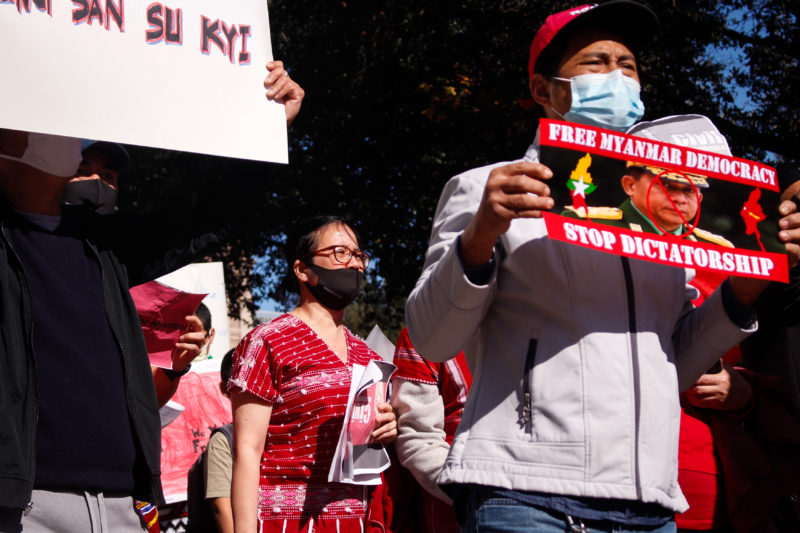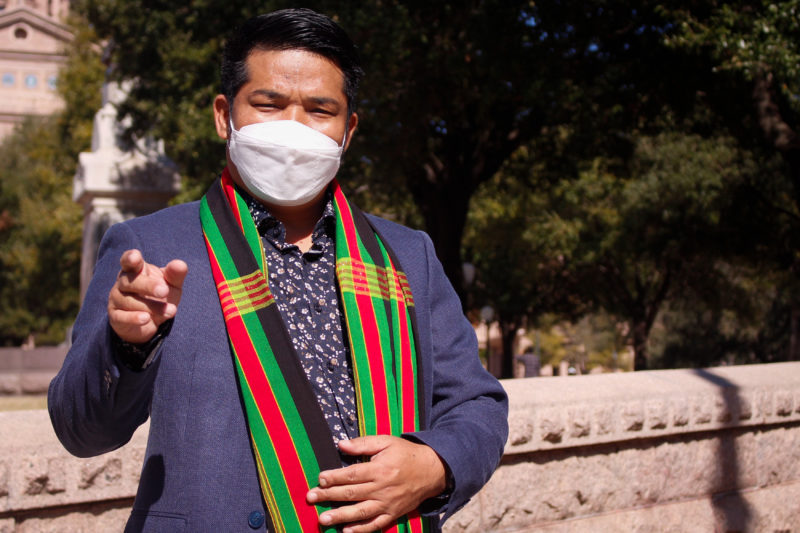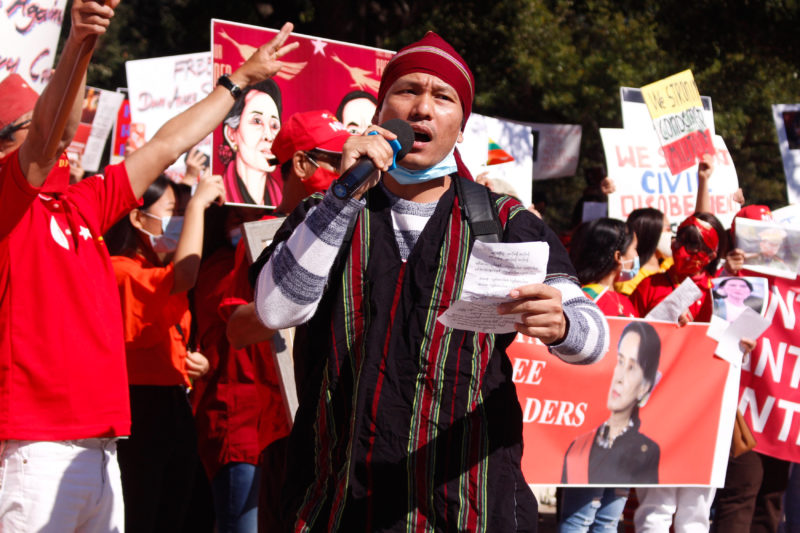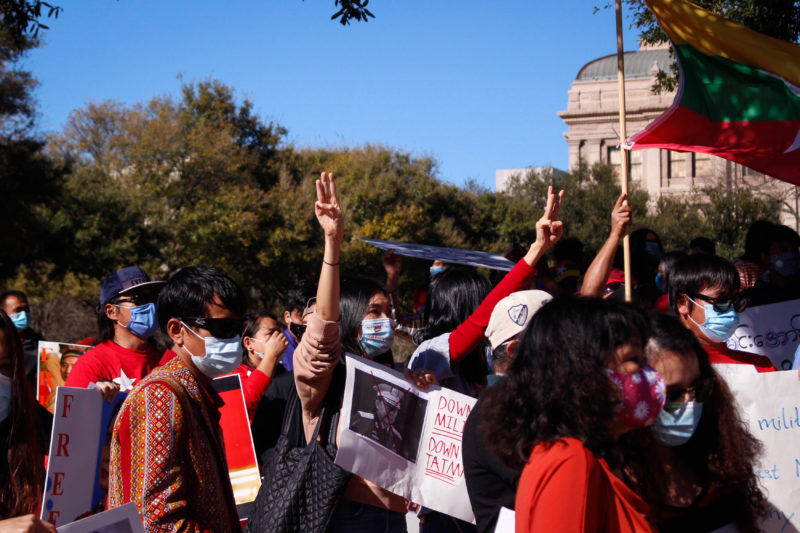Austin’s Myanmar Community Rallies Against Coup
By Benton Graham
Reporting Texas

Myanmar coup protestors march towards the entrance of the Texas Capitol on Feb. 6, 2021. Mizelle Mayo/Reporting Texas
About 150 supporters of democracy in Myanmar took to the Texas Capitol grounds today to protest the military coup that took place in the Southeast Asian country six days ago.
Protestors waved Myanmar flags and chanted, “democracy in Myanmar.” They held signs with the face of Aung San Suu Kyi, Myanmar’s civilian leader. Many also stomped on signs with the picture of Senior Gen. Min Aung Hlaing, the head of the Myanmar military.
On Monday, the Myanmar military seized power from Suu Kyi. Military leaders claimed the action was necessary due to irregularities in November’s general election.
Van Lian, a 32-year-old sushi chef, moved to Austin in 2009 after spending three years in a refugee camp in Thailand, he said. The rally was a way to boost awareness of the Myanmar coup in Austin and throughout the United States.
“Americans have the power to push for change in Burma,” Lian added, using another widely accepted name for Myanmar. Nations differ on what they call the country.

Johnathan Vantan, an organizer, speaks during the protest on Feb. 6, 2021 outside the Texas Capitol grounds. Van said he wanted to utilize his privilege of living in the United States to speak and raise awareness and support for the people of Burma and his family back home. Mizelle Mayo/Reporting Texas
Refugees from Myanmar make up a large percentage of the about 12,000 refugees living in Austin, according to the city. Texas has the largest share of Burmese refugees in the country, about 17,000 in 2016, the most recent numbers available.
Jangai Jap, a doctoral student studying Myanmar politics at George Washington University, said the coup was likely a result of the increasing threat Aung San Suu Kyi presents to the military’s authority in the country. The National League for Democracy, Suu Kyi’s pro-democracy party, won a landslide election in November.
Jap did not attend the protest in Austin, but she said protests allow “people to come together and express unity and express condemnation against what is happening in Myanmar and against the military regime.”
John Vantan, a 42-year-old City of Austin employee, said he fears for his family still living in Myanmar. Like other protestors, Tan has experienced challenges communicating with family this week, he said. The military regime has intermittently cut off telecommunications and shut down Facebook, a platform used by many in Myanmar.
“Starting on the first of February I could not contact them,” he said.
Tan moved to Austin in 2016 after eight years of waiting for his refugee status to be approved. He said he is happy to live in the city because of the education and the opportunities available to his four children. He hopes to take his children back to Myanmar to meet his parents someday but is now unsure when he will be able to do so.
“They are very worried and scared,” he added about his parents and siblings still in Myanmar.
Tan said the protestors fully support Suu Kyi, who won a Nobel Peace Prize, because she represents hope for democracy in Myanmar. During the last several years, the international community has criticized her for failing to stop what the U.N. deemed an example of ethnic cleansing against the Rohingya Muslims, an ethnic minority in the northwest of Myanmar.

Salai Thomas Hehzai, one of the protest organizers, chants in Burmese during the rally against the military coup in Myanmar on Feb. 6, 2021, outside of the Texas Capitol. Mizelle Mayo/Reporting Texas
Monica Aung, a 16-year-old student at Del Valle High School, said the protest gave the Myanmar community a chance to have a greater voice in Austin. She added that schools should teach more about international topics rather than only focusing on the United States.
“I wish the school system would talk more about the outside world,” Aung said. “Since the moment I came here, I haven’t heard anything about Burma.”
Aung was born in Myanmar but moved to Austin with her parents when she was 7. Her grandparents in Myanmar are worried because the military regime has limited their voices by shutting down communication, Aung said.
Alysia Duemler, a 30-year-old student at St. Edward’s University studying psychology and Spanish, didn’t have much familiarity with Myanmar before this week. When a friend sent her information about Saturday’s protest, she couldn’t help but draw a comparison between the Myanmar military coup and the insurrection at the United States Capitol on Jan. 6.
“Some would say we had a coup situation in the United States. Fortunately, that didn’t occur, but it’s actually occurring in Myanmar,” Duemler said.
Americans should speak up for the people hurt by the coup in Myanmar, Duemler said: “It’s important that we use our relative privilege and stand up for others.”

Protestors at the rally hold their right hand up in the air in a three-finger salute that a participant said represents duty to others, to self, and to god and country. The salute, originally featured as a symbol of dissent and rebellion in the movie the Hunger Games, has been utilized by protest movements in Myanmar, Hong Kong and Thailand. Mizelle Mayo/Reporting Texas